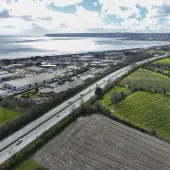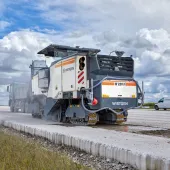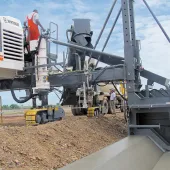Widening Uruguay's Ruta 5 Highway
Concrete paving for roads is rare in the UK but more common across Europe, where organisations like EUPAVE promote its use for infrastructure projects. In the Americas, concrete is frequently preferred for road construction due to its durability and ability to withstand heavy traffic and extreme weather conditions. A recent project in Uruguay highlights this approach, with Wirtgen’s advanced concrete paving machines being used to widen a key section of the Ruta 5 highway.
A major road construction project in Uruguay is making use of advanced concrete paving equipment from Wirtgen to widen a key section of the Ruta 5 highway, which runs from Montevideo to the Brazilian border. The upgrade involves expanding a 75 km stretch of the highway from one lane to two lanes in each direction and rehabilitating the existing road surface.
Ruta 5 is one of Uruguay’s most important highways, connecting the capital with the northern city of Rivera on the Brazilian border. Widening this key route involves four contractors working together, using a range of equipment, including three Wirtgen SP 64 slipform pavers, two TCM 180 texture curing machines, and a John Deere JD 318G skid steer loader.
The Ruta 5 widening project covers two sections: a 30 km stretch from Peaje Mendoza to the city of Florida and a 45 km stretch from Florida to Sarandí Grande. Each lane has a paving width of between 3.9 and 5m, with a total paving width of 15.6m across the new dual carriageways. The concrete paving is 220mm thick, and the insertion of steel reinforcement is fully integrated into the machine’s operations.
Improving Efficiency with Integrated Dowel Bar Inserter (DBI)
Traditionally, concrete roadways are reinforced with dowel baskets or steel rebar mats, which are placed before the paving process begins. However, pre-placing these materials can be time-consuming and restricts vehicle movement on-site, especially on challenging terrain. The use of Wirtgen’s SP 64 slipform paver with an integrated dowel bar inserter (DBI) has helped to streamline this process.
“The SP 64 allows us to achieve much higher productivity than we could with our previous method of using vibrating screeds,” said Sebastián Trujillo, a machine operator from R&K – Berkes, one of the contractors involved.
The DBI automatically places dowel and tie bars at the correct locations during the paving process, which improves accuracy and increases efficiency. Additionally, the concrete can be offloaded directly in front of the machine, giving construction vehicles more room to manoeuvre.
Precision Paving with 3D Control
The project also benefits from Wirtgen’s 3D control technology, which eliminates the need for traditional stringline guidance. Instead, the SP 64 pavers are guided by a virtual stringline, using data from a digital terrain model to control the machine’s height and positioning.
Two prisms mounted on the paver communicate with a total station, which provides precise three-dimensional data to the machine’s control system.
This advanced system offers several advantages, including greater freedom of movement for both the paving crew and the construction vehicles on-site. Without the constraints of physical stringlines, tipper trucks delivering concrete can drive directly to the slipform paver, reducing the need for detours and improving site logistics.
The virtual stringline system has also allowed the contractors to achieve a high International Roughness Index (IRI) score, indicating an exceptionally smooth road surface.










